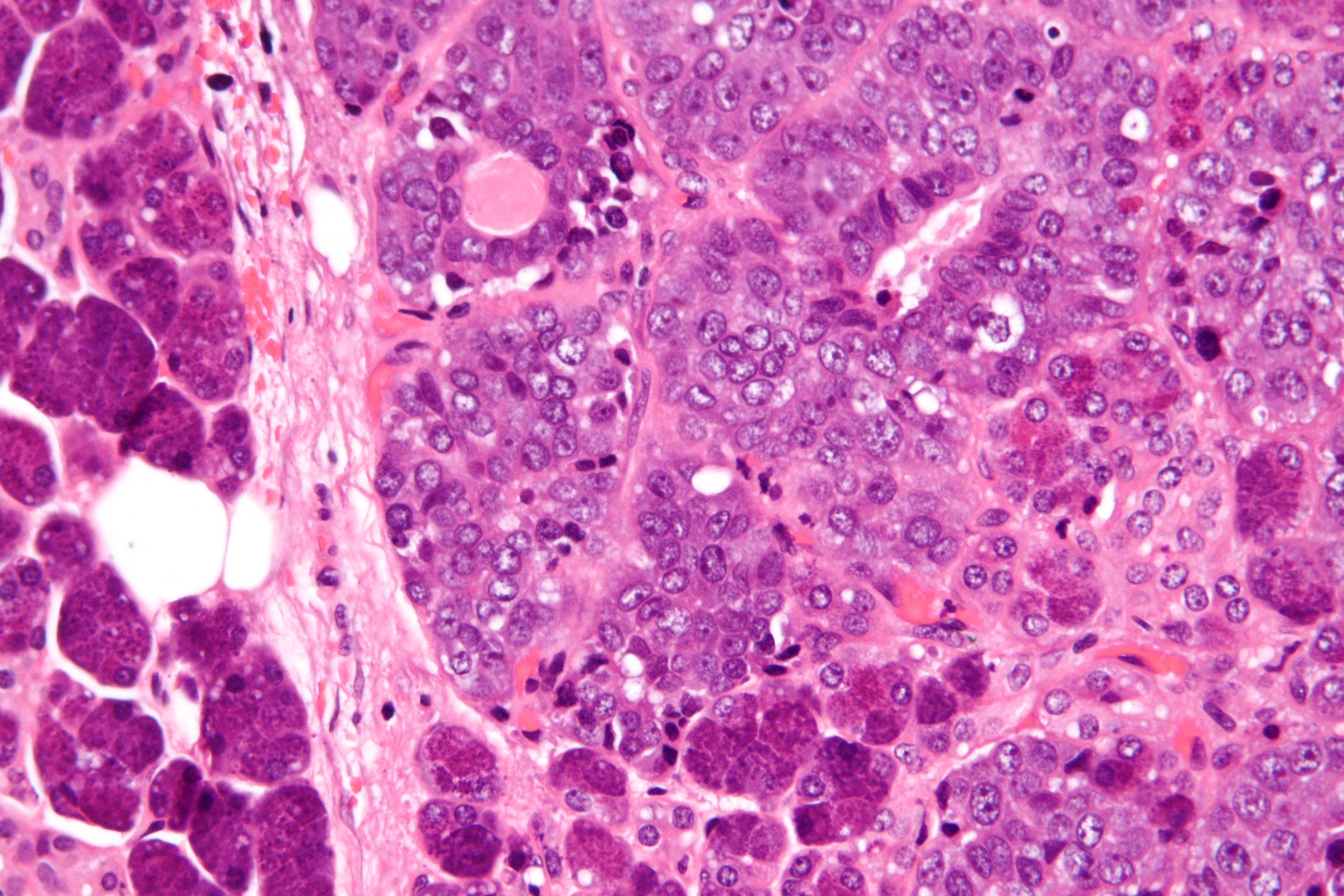Epithelial-myoepithelial carcinoma
Editor-In-Chief: Prab R Tumpati, MD
Obesity, Sleep & Internal medicine
Founder, WikiMD Wellnesspedia &
W8MD medical weight loss NYC and sleep center NYC
| Epithelial-myoepithelial carcinoma | |
|---|---|

| |
| Synonyms | |
| Pronounce | N/A |
| Specialty | N/A |
| Symptoms | Painless mass in the salivary gland |
| Complications | |
| Onset | |
| Duration | |
| Types | |
| Causes | Unknown |
| Risks | |
| Diagnosis | Biopsy |
| Differential diagnosis | Pleomorphic adenoma, Adenoid cystic carcinoma |
| Prevention | |
| Treatment | Surgery, Radiation therapy |
| Medication | |
| Prognosis | Generally good with treatment |
| Frequency | Rare |
| Deaths | |
A rare type of salivary gland tumor
Epithelial-myoepithelial carcinoma (EMC) is a rare type of salivary gland tumor characterized by its biphasic cellular composition, consisting of both epithelial and myoepithelial components. This tumor is most commonly found in the parotid gland, which is the largest of the salivary glands, but it can also occur in other salivary glands and occasionally in other locations.
Histopathology[edit | edit source]
Epithelial-myoepithelial carcinoma is distinguished by its unique histological appearance. The tumor is composed of duct-like structures lined by an inner layer of cuboidal epithelial cells and an outer layer of clear myoepithelial cells. The clear appearance of the myoepithelial cells is due to the presence of abundant glycogen in the cytoplasm. The stroma surrounding the tumor can vary from being scant to having a myxoid or hyalinized appearance.
Clinical Presentation[edit | edit source]
Patients with epithelial-myoepithelial carcinoma typically present with a slow-growing, painless mass in the region of the affected salivary gland. Due to its indolent nature, the tumor may be present for several years before diagnosis. In some cases, the tumor may cause facial nerve dysfunction if it invades or compresses the facial nerve.
Diagnosis[edit | edit source]
The diagnosis of epithelial-myoepithelial carcinoma is primarily based on histological examination of a biopsy specimen. Immunohistochemistry can be used to confirm the biphasic nature of the tumor, with epithelial cells typically expressing cytokeratin and myoepithelial cells expressing S-100 protein, smooth muscle actin, and other myoepithelial markers.
Treatment[edit | edit source]
The primary treatment for epithelial-myoepithelial carcinoma is surgical excision with clear margins. Due to the potential for local recurrence, complete surgical removal is essential. In some cases, radiation therapy may be considered, especially if surgical margins are positive or if the tumor is inoperable.
Prognosis[edit | edit source]
The prognosis for patients with epithelial-myoepithelial carcinoma is generally favorable, with a relatively low rate of metastasis. However, the tumor can recur locally, and long-term follow-up is recommended. The overall survival rate is high, but the risk of recurrence necessitates careful monitoring.
See also[edit | edit source]
Search WikiMD
Ad.Tired of being Overweight? Try W8MD's NYC physician weight loss.
Semaglutide (Ozempic / Wegovy and Tirzepatide (Mounjaro / Zepbound) available. Call 718 946 5500.
Advertise on WikiMD
|
WikiMD's Wellness Encyclopedia |
| Let Food Be Thy Medicine Medicine Thy Food - Hippocrates |
Translate this page: - East Asian
中文,
日本,
한국어,
South Asian
हिन्दी,
தமிழ்,
తెలుగు,
Urdu,
ಕನ್ನಡ,
Southeast Asian
Indonesian,
Vietnamese,
Thai,
မြန်မာဘာသာ,
বাংলা
European
español,
Deutsch,
français,
Greek,
português do Brasil,
polski,
română,
русский,
Nederlands,
norsk,
svenska,
suomi,
Italian
Middle Eastern & African
عربى,
Turkish,
Persian,
Hebrew,
Afrikaans,
isiZulu,
Kiswahili,
Other
Bulgarian,
Hungarian,
Czech,
Swedish,
മലയാളം,
मराठी,
ਪੰਜਾਬੀ,
ગુજરાતી,
Portuguese,
Ukrainian
Medical Disclaimer: WikiMD is not a substitute for professional medical advice. The information on WikiMD is provided as an information resource only, may be incorrect, outdated or misleading, and is not to be used or relied on for any diagnostic or treatment purposes. Please consult your health care provider before making any healthcare decisions or for guidance about a specific medical condition. WikiMD expressly disclaims responsibility, and shall have no liability, for any damages, loss, injury, or liability whatsoever suffered as a result of your reliance on the information contained in this site. By visiting this site you agree to the foregoing terms and conditions, which may from time to time be changed or supplemented by WikiMD. If you do not agree to the foregoing terms and conditions, you should not enter or use this site. See full disclaimer.
Credits:Most images are courtesy of Wikimedia commons, and templates, categories Wikipedia, licensed under CC BY SA or similar.
Contributors: Prab R. Tumpati, MD

